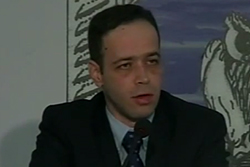By Ioannis Michaletos, Security Analyst
The ongoing war in Syria, reaches again a deadlock, since it has become obvious that arms and other supplies towards the Jihadists factions are still flowing.
Furthermore the Islamic State (I.S.) despite losing around 80% of its logistics and energy infrastructure manages to keep its core force of around 20,000 fighters intact and able to control large parts of the Syrian and Iraqi territory.
The lack of a finite political resolution is the primal reason for the above. First and foremost a ceasefire has not been practically implemented, thus the conflict is proceeding with ups and downs, nonetheless continuously. In turn that facilitates anarchy in Syria and prohibits the establishment of a new constitution and the implementation of general elections, before social and political life in the country could be normalized.
At the same time an “extremist” faction within the US State Department recently sent protest latter to the political heads, requesting an all-out war which will further devastate the Middle East and endanger the stability of the entire EU, taking into account the situation in Libya and the recent coup attempt in Turkey.
Simply put it there are forces that clearly aim to destabilize a vast and sensitive geopolitical area for unknown reasons, for sure those are not related with the well-being and strategic interest of the US. In a normal period, career diplomats who would attempt to sidetrack the Administration’s guidelines, would have been either sacked or moved to a less prestigious position. This was not the case this time.
Further, arms contraband networks continue to supply Jihadists mostly via the Syrian Desert caravan routes, with smaller supplies coming via Lebanon and Turkey. At the same time, Central Asian Jihadists keep on coming to fill the ranks of mostly European-descent one who have perished.
The ongoing narcotics trade in the region fuels revenues for the I.S. whilst a well-placed money laundering network from Sudan to the Gulf States ensures speedy clearance of needed transactions for them. In sort the anti-Jihadist campaign has not achieved the destruction of the I.S. but merely handicapped its capacities for further growth.
Meanwhile refugee flows keep on pilling up in Turkey which is in the midst of serious destabilization and the shift of immigrants from Libya to Italy is also directly related with the anarchic situation in the country as well due to the existence of dozens of Jihadist groups fighting there.
There is no stop in the flow of refugees and immigrants if the wars in these areas are not put out to an end. As a result EU is feeling the tremors in a political level, with the emergence of powerful, grass roots and nationwide political parties in Germany, France, Austria, and Netherlands that demand the breakup of the EU due to the faults of the Middle Eastern policies that cause the immigration havoc. Brexit was to a great extent facilitated by these geopolitical tremors.
International terrorism is also fueled by the wars in the Middle East and in particular Syria. A multiple of attacks have already happened and more are expected if one takes into account the reports by EUROPOL, French internal security agencies, as well as their German, Austrian, UK and Belgium counterparts. There are more than 300,000 radicalized Islamists in the EU ready to facilitate terrorist attacks in secondary and tertiary roles, plus additional 30,000 that could potentially be used in a an operational role.
It is impossible to secure the EU states from those merely by surveillance, whilst the I.S. is continuously improving its attack techniques, along with subversion and evasion methodology. In simple terms the whole of EU domestic security is at stake because of the fallout of the Arab Spring and the war in Syria. This has to be realized sooner rather than later.
Therefore a speedy and imminent restart of the peace negotiations should be underway, concerning all sides. At the same time the issue should be the first on the agenda of the EU leaders, while the infrastructure of the I.S plus other groups such as Al Nusra should be continuously and viciously attacked by all means.
The important aspect though would be the collaboration between Washington and Moscow, which are the definite key players in the Middle Eastern crisis. Thus certain steps that could be taken by both will achieve a peace keeping initiative.
These include:
– Joint military operations against all Jihadist factions in Syria/Iraq, via air, missile and SOF actions.
– Intel exchange regarding movements of Jihadists across the Middle East and into Turkey/Balkans/EU
-The above in conjunction with an EU 24/7 situation center
– Basic agreement regarding a roadmap for a new constitution and legislative elections in Syria
-Security roundtable with peripheral states such as Egypt, Turkey, Iran, Saudi Arabia. Whoever declines to join or obstructs would be also excluded from regional negotiations.
– Roadmap under the auspices of the UN on a reconstruction budget for the future of Syria/Iraq
-Same as above for Libya
As a basic outline measures as such could facilitate the neutralization of the I.S. and the rest of the Jihadist groups while they will provide a stable environment under which a future normalization process could emerge for the region. Regarding terrorism in particular it would be a great start for the sidelining of extremists across Europe, once their “cause célèbre” ceases to exist, as well as their controllers in the Levant.
This article was first published in rimse.gr

